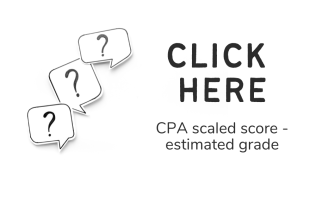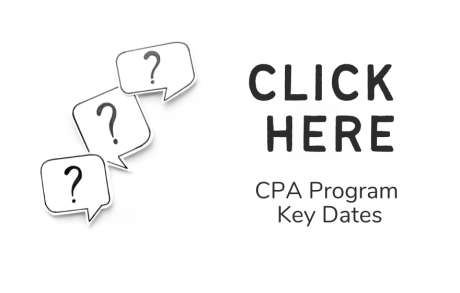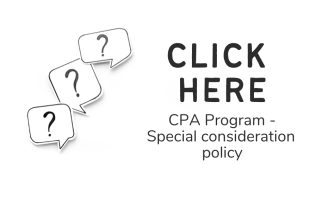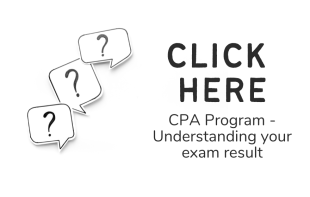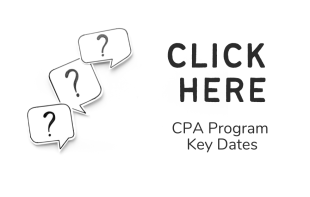
What is the pass mark?
There is no published ‘pass mark’.
This is very unusual and might feel a bit uncomfortable, but CPA Australia used a special process to set the pass mark and it is not as simple as saying ‘50% is the pass mark’.
Why?
The pass mark is determined based on identifying what the ‘minimally competent candidate’ is. So it could be 40%, 53%, or 65% – depending on the subject and exam difficulty level and what a panel of experts determine a minimally competent candidate should achieve.
Should you be worried? No
How do you know if you are likely to pass?
Simple: Do the practice exams.
You then get an estimated grade based on your result based on data from thousands of people who already did the practice exams and the final CPA exam and had the data compared.
Check out this blog post that has the Estimated Grade for results in every subject and explains how to get an estimated scaled score:
What happens if I do not click 'SUBMIT' on my exam?
It will automatically submit once the exam time runs out.
The exam system automatically saves your responses and your progress.
At the end of the exam time, the exam is submitted automatically whether you clicked the ‘Submit’ button or not.
Are the practice exams available until the end of the exam period?
Am I allowed to take a pen or pencil or access the online version of the study guide in my final exam?
No you cannot use the online PDF or take a computer or use Excel in your exam.
You also cannot take in a pen or pencil or blank paper.
You can take your:
- Hardcopy study guide (Yes – you can make notes on the pages / highlights)
- Calculator (we recommend a scientific calculator for exams that have calculations)
- Hand-written notes
- Typed / Printed notes
- Dictionary
Should I defer?
There is a simple checklist to determine if you should defer.
If it is early in the semester and you have fallen behind and have no chance of catching up – Yes. Defer.
If you are still studying but unsure if you are doing well enough then follow these steps:
- Keep studying
- Do the first practice exam before the final deferral date (just before the exam period begins)
- Compare your practice exam result to the Estimated Grade Table that you see at the end of your practice exam (or click the link below)
- If you scored very low and are likely to fail – then defer
- If you scored just below average or above and are likely to pass – then continue studying
How do the practice exams compare to the final exams?
The practice exams are comparable in length, structure and difficulty to the final exams.
In some subjects like Financial Reporting and Digital Finance ours seem to be a little bit harder.
In other subjects like Ethics & Governance our seems to be a bit easier.
This does not matter or affect your result.
If you find the final exam harder, this doesn’t mean you panic and say you will fail.
Why does the final exam feel much harder?
- You are under pressure and stress and you know the result counts for something
- You do not get to see your result immediately or the solutions and so questions feel more difficult
- You may get stuck trying to prove every answer by referencing the study guide and run out of time, instead of just trusting your knowledge
- You may be much more tired because you haven’t slept well or been stressed before the exam
- Very talented students get upset when they can’t answer a few questions and that feeling taints the whole exam experience
Will you pass even if you found the exam hard?
Compare your practice exam result to the estimated grade table – this will give you the best comparison available.
Check out the following link:
What notes can I take into my final exam? Is it okay if my notes are in a binder?
You can take your hardcopy study guide, calculator and any additional handwritten or printed notes with you.
How do I know if my calculator is acceptable to take into my CPA exam?
You can take any calculator in to your exam, including a scientific calculator or a financial calculator, as long as it does not have any data storage or recording functions, and its primary purpose is a calculator.
CPA Australia will not provide you with a list of appropriate models, because there are so many to choose from.
There is a simple test: Can you do all the calculations that you have found throughout the study guide?
If the answer is yes – then, the calculator will be adequate. If not, then we’d recommend you invest in an appropriate calculator.
An onscreen scientific calculator is provided to you in your exam.
You can buy a reasonable scientific calculator for under $30.
Here is an example of different types:

https://www.officeworks.com.au/shop/officeworks/c/office-supplies/calculators/scientific-calculators
If I defer, will I still be able to access Guided Learning?
Yes.
You can access Guided Learning up until MYOL is disabled. If you defer you need to login directly to our website rather than via the CPA Website.
www.knowledgequity.com.au
I failed - I can't believe it. What do I do now?
When you fail it can really hurt – especially if you feel you did the work and were not expecting the result.
Here is some guidance on what to reflect on to help you move forward.
How did you prepare for your exam? Here are a few things to reflect on:
- When you honestly assess yourself, would you say you worked very hard to pass or do you feel there is room for improvement when it comes to your study habits?
- If you know, what’s your biggest obstacle to studying or passing and can it be eliminated or at least reduced?
- Would it be worthwhile to find a study group where you can hold each other accountable and also discuss challenging topics?
- Did you allocate enough time for your studies?
- Did you use Guided Learning effectively – going through the units, watching videos, attempting all the quizzes?
- Was the mid-semester test attempted and also the two practice exams?
- Did you study actively and regularly – did you write your own notes/index?
- How many times did you go through the study guide?
- Were all questions in the study guide attempted and understood?
I failed - Can I apply for special consideration?
No.
Once results are out you cannot apply.
Please note that special consideration with CPA is very different to University.
At university you may be granted a pass even if you scored quite a level below the pass mark. However, with CPA, it is only going to be relevant if you were very close to the pass mark (i.e. 538 / 539) as you must still demonstrate competence. It is not as generous as university level. They also don’t provide for re-sits and require you to enrol again for another whole semester.
Special consideration is applied for after sitting your exam if you faced circumstances beyond your control which would affect your exam preparation or exam performance.
I failed - Can I sit a supplementary exam or ask for a review?
No
CPA do not provide supplementary exams.
CPA do not allow for reviews and will not do it once results have been released. They will also not allow you to apply for special consideration after results are released.
There are over 20,000 enrolments a semester, and the average fail rate is 35% of people.
So if CPA allowed for reviews there would be thousands required. So, they check every exam carefully prior to results being published, so a review is unnecessary.
You will be required to enrol again for another whole semester.
This link explains it further:
I failed - should I repeat the same subject or do two next semester to catchup?
Should I repeat the same CPA subject again if I failed?
No. Do another CPA subject.
I failed one subject. Should I do two CPA Subjects to catch up?
No…please no…just don’t do it.
Why should I do a different CPA subject?
Reason 1: The majority of people who repeat a CPA subject fail it on the second attempt.
Why? Not because it is too hard. It is because they do not do enough work the second time.
The behaviour pattern goes like this: I scored 530 and I needed 540. So, I will repeat the subject as I only need 10 more to get a pass. So, I will study the modules I did bad in, and assume my other modules will stay at the same level. I will start studying about week 7.
Result: You get 530. You do better in the modules you previously did badly in.
You do worse in the modules you previously did well in. You end up getting the same score or lower.
Solution 1: Do the CPA subject again as if you have never seen it. (This is virtually impossible…you will skim read pages…you will skip over quizzes…you will get bored).
Solution 2: Do a different CPA subject. Then, when you come back to the CPA subject you failed you will have fresh eyes.
I failed one subject. Should I do two CPA Subjects to catch up?
No…please no…just don’t do it.
Think about why.
You just failed a subject, so what chance have you got of passing two subjects?
You may easily fall into the trap discussed above of not doing enough work. If you scored 530 you don’t need to just get 10 more marks to get to 540. You have to treat it like a new subject.
Result: You will most likely fail at least one subject (probably the one you previously failed) or you will fail both subjects, because you are spread too thin.
Solution 1: Your career is going to last many decades. It does not matter if you take an extra 6 months to finish the CPA Program. Less stress. More success. Just do 1 subject at a time.
Solution 2: Try and do 2 subjects. Maybe pass. Maybe lots of stress and pressure. Maybe fail. Who needs that?
Should I keep going or quit the CPA Program?
Sometimes it is good to not give up.
But, if you are not really in a position to successfully pass the subjects then you have to consider the cost and time you are devoting to the CPA Program and whether it is better to pause your studies or discontinue completely.
If you have consistently failed subjects, if you are scoring in the 400s, if you have repeated a subject several times and are not improving your result – these are all good reasons to to pause your CPA studies.
If you are close, but not getting through, this is an expensive and stressful process to work through.
You may find that with a 2 year break you can come back to your studies with more energy and knowledge, and then perform really well. The aim is not to get a 540 and just get through. It should be about mastering the material, so you can get 600+ and pass confidently and easily.
If you are unsure what to do – please email us at help@Keq.com.au and also include your scaled score results PDF for the subjects you have attempted.
I am running out of time to finish the CPA Program, will CPA give me an extension?
Short answer = Yes
Longer answer = Yes – in nearly all situations, if you can show CPA Australia you are working towards completing the program then you can continue. This rule is designed to stop people who sign up as Associate Members and never intend to actually do the CPA Program and become full members, but still take advantage of calling themselves a member of CPA Australia.
I need specific help or guidance with what to do next - can you help? (Yes we can...)
We can give you more specific guidance and help depending on your situation. For us to be helpful, when you email us, please send through:
- A copy of your result / scaled score, so we can see your overall score and your result by module
- If you have failed more than once please send the results for each attempt you have made.
- A description of how you study
- How often each week
- How long you spend each study session
- How you study – e.g. things like how you summarise, take notes, create an index, attempt questions
- How you went in your practice exams, and when you did them compared to your final exam (e.g. 1 week before)
I passed - This was my final subject, am I a CPA?
Most members need to complete three requirements to become a CPA:
- Your experience
- Your CPA Program subjects
- Your degree
If you’ve already completed your experience and degree, and you’ve just passed your final subject, CPA Australia will review your profile and you’ll be notified of your new CPA status via email. This can take a couple of weeks from when you receive your result, so please be patient. CPA Australia will let you know as soon as possible.
If you became an Associate member via a Mutual Recognition Agreement, you may also need to complete the professional development course Better practice in governance and accountability in order to advance.
If you believe you’re eligible to advance to CPA status but haven’t received notification from CPA Australia within a month of finishing your requirements, please contact CPA Member Services.
I passed - What subject should I do next?
We recommend that you complete the compulsory core subjects first then complete your electives.
Subject Order
1st – Ethics & Governance (EG)
2nd – Strategic Management Accounting (SMA)
3rd – Financial Reporting (FR)
4th – Global Strategy & leadership (GSL)
5th – Elective 1
6th – Elective 2
CPA Subject choice tips:
– Don’t leave FR until last, even though it is really tough. If you get stuck on FR you want to find out earlier rather than later, so you can decide whether to continue with your studies.
– Don’t do AAA before FR; Audit involves careful consideration of IFRS which are covered in FR.
Most people must do the 4 CPA compulsory core subjects plus 2 electives. In this situation you cannot do GSL until you have completed the other 3 compulsory core subjects. Some people are given exemptions. Others have no electives and must do specific subjects as electives.
1. Why start with the compulsory core subjects? There is no point doing electives until you have mastered the core. If you cannot master the core, then you cannot complete the program. If you start with electives and only after that attempt the core, you may find out much later that you are not going to continue with your CPA studies due to the difficulty level or other reasons.
2. Why start with Ethics and Governance first? It is the introduction course to becoming a professional accountant. It introduces concepts that are explored further in later subjects. For most people it is also the easiest core subject. So, it is best to start the CPA Program here. This is the time to learn how to study online and without the typical support and structure you get at university level.
3. Why Strategic Management Accounting (SMA) second and Financial Reporting (FR) third? SMA is more difficult than EG but not as hard or time consuming as FR for most people. So, this is the second stage in mastering the CPA Program. Many people find the jump from EG straight to FR too hard. They do not put in enough work and find it very stressful and often fail. So, EG, then SMA then FR is the best progression that supports your successful completion of the program.
4. Why Global Strategy and Leadership (GSL) fourth? Shouldn’t it be last? Theoretically, it should be last. GSL is a capstone subject that brings all your CPA studies together. But, because it is a compulsory core subject, we think it is best to do before your electives. If you cannot make it through this subject, there is little benefit in doing the electives as you will not successful complete the CPA Program.
5. Which elective should I choose? Do the subjects that are likely to assist with your future career direction. Getting your accreditation as a CPA is critical, but you should have also mapped out some idea of where your next career steps will likely be. There is no ‘easiest’ CPA Subject. They are all hard. So, do not try and choose the CPA elective that is easiest.
Some useful examples:
Public Practice or Technical Accountant: Advanced Audit & Assurance and Australia Taxation.
Tax Practitioner: Advanced Audit & Assurance and Australia Taxation and Australia Taxation – Advanced would be the best fit.
Accountant in Business / Consulting: Contemporary Business Issues & Digital Finance.
Management Accounting / Treasury: Contemporary Business and Financial Risk Management.
I passed - is the study guide changing for my next subject?
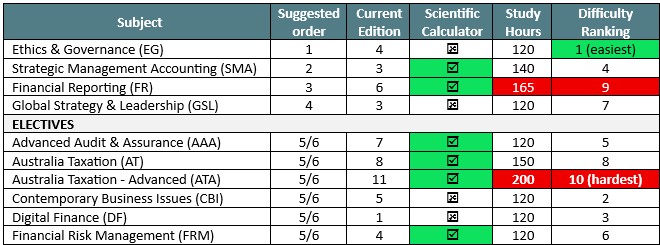
SCIENTIFIC CALCULATOR: We recommend using a scientific calculator. An onscreen scientific calculator is provided to you in your exam.
HARDCOPY STUDY GUIDES: These will be sent out to you from Tuesday 6 January. Study guides are only sent to you by mail after the closing date for cancellations with a refund (5 January).
CPA Program Study Guide PDFs are available when you enrol in your subject. Print out Chapter 1 and start studying immediately – don’t wait for the hard copy.
I passed - What do I do now? Should I start studying straight away?
Please don’t try and start studying straight away.
Give yourself a break…
Then set a start time such as 5 January to get a great headstart on semester
Then dive in properly
To get started – scroll down to the bottom of this page – you can get our FREE Module 1 CPA Assist resources including quizzes, videos and webinars. Just click on the subject you plan to study
How is a Credit, Distinction or High Distinction worked out?
All candidate results are plotted on a curve.
You can work out a standard deviation on this curve, and a Credit is 1 standard deviation above a Pass.
Distinction is 2 standard deviations. HD is 3 standard deviations.
So, in some subjects there is a wider, flatter graph, and in other subjects a taller, narrower graph. So, that is why a particular scaled score in one subject may be a Distinction but in another subject it is only a credit.
Check out this blog post that explains how to get an estimated scaled score:
What is the easiest subject in the CPA Program so I can decide which subject to do next?
This is the wrong question! Better questions are:
1. Which CPA Subject will best help me in my career?
2. Which CPA Subject will I find the most interesting?
There is no correct answer to which is easiest, because what is easy for one person is not easy for another:
a) Technical subjects like Financial Reporting (FR), Financial Risk Management (FRM) and Taxation (AT and ATA) are easy for some people who like to follow specific rules and checklists, and hard for others who are less disciplined to work through every step.
b) Conceptual subjects like Ethics & Governance (EG), Contemporary Business Issues (CBI) and Global Strategy & Leadership (GSL) are easy for some people who like concepts, ideas and lots of stories and examples. But, some people find these extremely hard and ambiguous, because they prefer clear rules for everything.
As an example, I find EG, SMA, CBI and GSL very easy. I can read them once and grasp them well and remember them clearly. But, FR, FRM and Tax for me are hard work. I can still learn them, but I have to really work at them. So, each person is different.
Some other things to keep in mind are:
- Try not to use previous semester CPA pass rates as a factor to inform your subject selection.
- Try not to be influenced by the opinions of others on the difficulty levels of subjects as what one person finds difficult, another person might find easy.
- If you have deferred or failed a subject, don’t just assume that you can/should take multiple subjects the following semester to ‘catch-up’. You need to make sure you have the time and discipline to get through both subjects – you don’t want to dig yourself into a deeper hole!
- Length of the study guide (for instance number of modules or number of pages) is not always relevant. Some people find it much easier to master technical, rule based content – while others prefer conceptual and narrative based reading.
Should I do 2 subjects together?
Doing Two CPA Subjects or more in a Semester:
| Combination | Elective 1 | Elective 2 | Additional Notes |
| 1 | AAA | AT | Combines two theoretical subjects (compulsory if not studied previously) |
| 2 | CBI | DF | Combines two conceptual (sometimes overlapping) subjects |
| 3 | CBI | FRM | Combination for a management accountant |
| 4 | AAA | FRM | Combination for risk-based roles |
| 5 | FRM | DF | Combination for finance-focused roles |
| 6 | AT | FRM | Combination for a financial controller |
| 7 | AAA | ATA | Combination for public practice (if already studied Australia taxation) |
| 8 | AT | ATA | Combination for public practice/ tax practitioner roles |
Should I do two CPA subjects at once? (and what CPA subject goes best with Financial Reporting?)
No – This is very important if you have failed one subject, and think by taking two subjects you will ‘catch up’. You probably won’t. You will probably be incredibly stressed and may just fail more subjects.
No again – if you are doing Financial Reporting (FR) or Australia Taxation – Advanced (ATA).
No – especially if you are working full time or have family commitments.
We do not recommend this for most candidates.
High study workloads coupled with hard subject combinations often lead to poor results.
Is it ever a good idea?
Yes, if you have good undergraduate knowledge (you remember your studies) and you performed well at undergraduate level, and you have enough time available, and you are very organised and diligent.
No, if you are not organised, can’t study effectively by yourself, if you are working full time, if you have family commitments, or you would like to enjoy your life.
We know people will enrol in two subjects anyway – so if you are going to try it, here are some tips to provide greater chances of success and to protect your sanity.
- Avoid Financial Reporting with another subject – it is also very long, very difficult, and requires significant effort.
- Avoid Australia Taxation – Advanced with another subject as there is a significant volume of study material (learn more about this subject in this blog), especially if it has been some time since you completed taxation at university level.
- If you are working full time, you will find it very difficult to do two subjects well unless you are extremely disciplined.
Strategic Management Accounting goes well with Ethics & Governance, or Contemporary Business Issues or Financial Risk Management. If you are really disciplined and organised, then you may consider Financial Reporting and Advanced Audit and Assurance together.
Try to ensure that you have allowed yourself sufficient time between exam dates (perhaps schedule one exam at the start of the exam week and the other exam at the end). You will need to be disciplined with your study technique to ensure that you are allocated an adequate amount of study time to both subjects.
Is the study guide changing for my next subject?
There are no study guide updates in S1, 2026. Please see the following tables for the current study guide editions:

SCIENTIFIC CALCULATOR: We recommend using a scientific calculator. An onscreen scientific calculator is provided to you in your exam.
HARDCOPY STUDY GUIDES : These will be sent out to you from Tuesday 6 January. Study guides are only sent to you by mail after the closing date for cancellations with a refund (5 January).
CPA Program Study Guide PDFs are available when you enrol in your subject. Print out Chapter 1 and start studying immediately – don’t wait for the hard copy.
What subject should I do next?
We recommend that you complete the compulsory core subjects first then complete your electives.
Subject Order
1st – Ethics & Governance (EG)
2nd – Strategic Management Accounting (SMA)
3rd – Financial Reporting (FR)
4th – Global Strategy & leadership (GSL)
5th – Elective 1
6th – Elective 2
CPA Subject choice tips:
– Don’t leave FR until last, even though it is really tough. If you get stuck on FR you want to find out earlier rather than later, so you can decide whether to continue with your studies.
– Don’t do AAA before FR; Audit involves careful consideration of IFRS which are covered in FR.
Most people must do the 4 CPA compulsory core subjects plus 2 electives. In this situation you cannot do GSL until you have completed the other 3 compulsory core subjects. Some people are given exemptions. Others have no electives and must do specific subjects as electives.
1. Why start with the compulsory core subjects? There is no point doing electives until you have mastered the core. If you cannot master the core, then you cannot complete the program. If you start with electives and only after that attempt the core, you may find out much later that you are not going to continue with your CPA studies due to the difficulty level or other reasons.
2. Why start with Ethics and Governance first? It is the introduction course to becoming a professional accountant. It introduces concepts that are explored further in later subjects. For most people it is also the easiest core subject. So, it is best to start the CPA Program here. This is the time to learn how to study online and without the typical support and structure you get at university level.
3. Why Strategic Management Accounting (SMA) second and Financial Reporting (FR) third? SMA is more difficult than EG but not as hard or time consuming as FR for most people. So, this is the second stage in mastering the CPA Program. Many people find the jump from EG straight to FR too hard. They do not put in enough work and find it very stressful and often fail. So, EG, then SMA then FR is the best progression that supports your successful completion of the program.
4. Why Global Strategy and Leadership (GSL) fourth? Shouldn’t it be last? Theoretically, it should be last. GSL is a capstone subject that brings all your CPA studies together. But, because it is a compulsory core subject, we think it is best to do before your electives. If you cannot make it through this subject, there is little benefit in doing the electives as you will not successful complete the CPA Program.
5. Which elective should I choose? Do the subjects that are likely to assist with your future career direction. Getting your accreditation as a CPA is critical, but you should have also mapped out some idea of where your next career steps will likely be. There is no ‘easiest’ CPA Subject. They are all hard. So, do not try and choose the CPA elective that is easiest.
What is the exam structure for my CPA Program subject?
The CPA Exam is worth 100% of your mark. There are no other assessment items.
CPA Australia will publish the exam structures and marks for Semester 1 2026 in January 2026, but you can use these as preliminary guidance until this information is available.
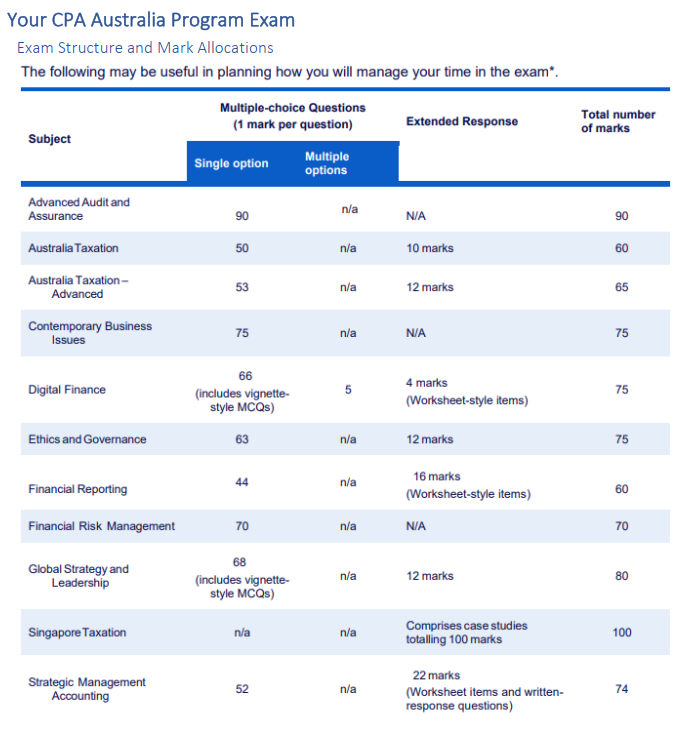
AAA, CBI and FRM only have MCQs. There is only one correct answer for each question in these subjects.
All other CPA exams have an MCQ and an ERQ component.
Vignette style MCQs: A vignette is a small case that you are presented with which will have two or more multiple choice questions attached. We provide examples of these in our practice exams.
Multi-Option MCQ: In Digital Finance there are 5 questions that are a special type of MCQ. Here, there is more than one correct answer and you have to select all the correct options to get the answer right.
What is the ERQ? How many questions are in the ERQ?
ERQ (extended response questions) can require written response or worksheet response (where you enter numbers into a worksheet). CPA Australia do not publish how many questions there will be in the ERQ component of the exam. Our practice exams give you lots of ERQ examples, to help you prepare.
Worksheet response: Here you enter the correct number into the worksheet.
You do not show your calculations – just enter the final number. You will be advised the number of decimal points required.
The ERQ for Digital Finance will require you to rank options in order. We provide examples of this style of question in our two practice exams.
Written response: Here you answer a question. We provide guidance on how to answer a written response question in guided learning, and you can practice with our webinar tasks and in our practice exams. In Ethics & Governance we show how to use the AAA model for ethical responses, and the IRAC method for legal responses.
Do you have to pass every module, or pass both the MCQ and ERQ in an exam?
No. You just need a combined total that is reaches the pass mark scaled score of 540.
Is the pass mark 50%? What does a scaled score of 540 mean?
Check out our blog post that explains the ‘CPA Scaled Score’ for more information:
CPA Australia have also published an explanation “Understanding your exam result” that you may find useful:
I get this message 'You are not enrolled in any courses', when logging in. What should I do?
You need to access Guided Learning via MYOL on the CPA website.
This will add your subject to the dashboard and your email address to the subject email group.
What is the easiest subject for me to do next?
This is the wrong question! Better questions are:
1. Which CPA Subject will best help me in my career?
2. Which CPA Subject will I find the most interesting?
There is no correct answer to which is easiest, because what is easy for one person is not easy for another:
a) Technical subjects like Financial Reporting (FR), Financial Risk Management (FRM) and Taxation (AT and ATA) are easy for some people who like to follow specific rules and checklists, and hard for others who are less disciplined to work through every step.
b) Conceptual subjects like Ethics & Governance (EG), Contemporary Business Issues (CBI) and Global Strategy & Leadership (GSL) are easy for some people who like concepts, ideas and lots of stories and examples. But, some people find these extremely hard and ambiguous, because they prefer clear rules for everything.
As an example, I find EG, SMA, CBI and GSL very easy. I can read them once and grasp them well and remember them clearly. But, FR, FRM and Tax for me are hard work. I can still learn them, but I have to really work at them. So, each person is different.
Some other things to keep in mind are:
- Try not to use previous semester CPA pass rates as a factor to inform your subject selection.
- Try not to be influenced by the opinions of others on the difficulty levels of subjects as what one person finds difficult, another person might find easy.
- If you have deferred or failed a subject, don’t just assume that you can/should take multiple subjects the following semester to ‘catch-up’. You need to make sure you have the time and discipline to get through both subjects – you don’t want to dig yourself into a deeper hole!
- Length of the study guide (for instance number of modules or number of pages) is not always relevant. Some people find it much easier to master technical, rule based content – while others prefer conceptual and narrative based reading.
Should I do 2 subjects together?
Doing Two CPA Subjects or more in a Semester:
| Combination | Elective 1 | Elective 2 | Additional Notes |
| 1 | AAA | AT | Combines two theoretical subjects (compulsory if not studied previously) |
| 2 | CBI | DF | Combines two conceptual (sometimes overlapping) subjects |
| 3 | CBI | FRM | Combination for a management accountant |
| 4 | AAA | FRM | Combination for risk-based roles |
| 5 | FRM | DF | Combination for finance-focused roles |
| 6 | AT | FRM | Combination for a financial controller |
| 7 | AAA | ATA | Combination for public practice (if already studied Australia taxation) |
| 8 | AT | ATA | Combination for public practice/ tax practitioner roles |
Should I do two CPA subjects at once? (and what CPA subject goes best with Financial Reporting?)
No – This is very important if you have failed one subject, and think by taking two subjects you will ‘catch up’. You probably won’t. You will probably be incredibly stressed and may just fail more subjects.
No again – if you are doing Financial Reporting (FR) or Australia Taxation – Advanced (ATA).
No – especially if you are working full time or have family commitments.
We do not recommend this for most candidates.
High study workloads coupled with hard subject combinations often lead to poor results.
Is it ever a good idea?
Yes, if you have good undergraduate knowledge (you remember your studies) and you performed well at undergraduate level, and you have enough time available, and you are very organised and diligent.
No, if you are not organised, can’t study effectively by yourself, if you are working full time, if you have family commitments, or you would like to enjoy your life.
We know people will enrol in two subjects anyway – so if you are going to try it, here are some tips to provide greater chances of success and to protect your sanity.
- Avoid Financial Reporting with another subject – it is also very long, very difficult, and requires significant effort.
- Avoid Australia Taxation – Advanced with another subject as there is a significant volume of study material (learn more about this subject in this blog), especially if it has been some time since you completed taxation at university level.
- If you are working full time, you will find it very difficult to do two subjects well unless you are extremely disciplined.
Strategic Management Accounting goes well with Ethics & Governance, or Contemporary Business Issues or Financial Risk Management. If you are really disciplined and organised, then you may consider Financial Reporting and Advanced Audit and Assurance together.
Try to ensure that you have allowed yourself sufficient time between exam dates (perhaps schedule one exam at the start of the exam week and the other exam at the end). You will need to be disciplined with your study technique to ensure that you are allocated an adequate amount of study time to both subjects.
When will I get the hardcopy of my study guide?
HARDCOPY STUDY GUIDES: These will be sent out to you from Tuesday 6 January. Study guides are only sent to you by mail after the closing date for cancellations with a refund (5 January).
CPA Program Study Guide PDFs are available when you enrol in your subject. Print out Chapter 1 and start studying immediately – don’t wait for the hard copy.
Why enrol early and when should I get started?
Why enrol early?
1 – You get a copy of the study guide PDF (use Control S to save it to your computer).
2 – You have a wider range of exam time choices
BUT
You will not get the hard copy study guide any earlier. They are only mailed out when the free cancellation date passes.
You should start studying at least 3 weeks before the official start of semester. So do not wait for the hardcopy. Print out the first module or two and get working.
I am not receiving the weekly emails, what should I do?
In order to receive our weekly emails you need to make certain, you have accessed Guided Learning via MYOL (on the CPAA website).
This will add your subject to the Guided Learning dashboard and your email address to the subject email group.
You need to make certain to do this for each subject you are enrolled in!
When will I get my study guide?
Usually 1 week before semester starts.
HARDCOPY STUDY GUIDES:
These will be sent out to you from Tuesday 6 January. Study guides are only sent to you by mail after the closing date for cancellations with a refund (5 January).
So you may not get this for 2 weeks from this date.
CPA Program Study Guide PDFs are available when you enrol in your subject. Print out Chapter 1 and start studying immediately – don’t wait for the hard copy.
What are the links for the Facebook groups?
| CPA Program Subject | Facebook Group |
| Ethics & Governance | EG Facebook |
| Strategic Management Accounting | SMA Facebook |
| Financial Reporting | FR Facebook |
| Global Strategy and Leadership | GSL Facebook |
| Advanced Audit & Assurance | AAA Facebook |
| Australia Taxation | AT & ATA Facebook |
| Australia Taxation – Advanced | AT & ATA Facebook |
| Contemporary Business Issues | CBI Facebook |
| Digital Finance | DF Facebook |
| Financial Risk Management | FRM Facebook |
How do I make sure I get the KnowlegEquity weekly emails?
You need to login to Guided Learning via MYOL on the CPA website.
This will add your subject to the dashboard and your email address to the subject email group.
I can't see my course in the dashboard - what do I do?
You need to login to Guided Learning via MYOL on the CPAA website.
This will add your subject to the dashboard and your email address to the subject email group.
I am not getting the weekly emails what should I do?
In order to receive our weekly emails you need to make certain, you have accessed Guided Learning via MYOL (on the CPAA website).
This will add your subject to the Guided Learning dashboard and your email address to the subject email group.
You need to make certain to do this for each subject you are enrolled in!
What are the links for the Facebook groups?
| CPA Program Subject | Facebook Group |
| Ethics & Governance | EG Facebook |
| Strategic Management Accounting | SMA Facebook |
| Financial Reporting | FR Facebook |
| Global Strategy and Leadership | GSL Facebook |
| Advanced Audit & Assurance | AAA Facebook |
| Australia Taxation | AT & ATA Facebook |
| Australia Taxation – Advanced | AT & ATA Facebook |
| Contemporary Business Issues | CBI Facebook |
| Digital Finance | DF Facebook |
| Financial Risk Management | FRM Facebook |
Does the MST and PEs count towards my final grade?
No they do not.
Your result is based 100% on your final CPA Program exam.
What are the corrections & FAQs for my CPA subject?
CPA Program Subject |
Corrections Download |
FAQs Download |
| Ethics & Governance | EG CPA Corrections | EG FAQs |
| Financial Reporting | FR CPA Corrections | FR FAQs |
| Global Strategy and Leadership | GSL CPA Corrections | GSL FAQs |
| Strategic Management Accounting | SMA CPA Corrections | SMA FAQs |
| Advanced Audit & Assurance | No CPA Corrections | AAA FAQs |
| Australia Taxation | AT CPA Corrections | AT FAQs |
| Australia Taxation – Advanced | ATA CPA Corrections | ATA FAQs |
| Contemporary Business Issues | CBI CPA Corrections | CBI FAQs |
| Digital Finance | DF CPA Corrections | DF FAQs |
| Financial Risk Management | FRM CPA Corrections | FRM FAQs |
What are the dates for the Mid-Semester test (MST)?
The mid-semester test is released on the Friday of Week 4 and removed from Guided Learning on the Tuesday (12pm Melbourne time) of Week 6.
For Semester 1, 2026 the Mid-semester test will be released on 26 February at 2pm (Melbourne time) and removed on 9 March at 11:59pm (Melbourne time).
What will modules are tested in the MST and Practice Exams?
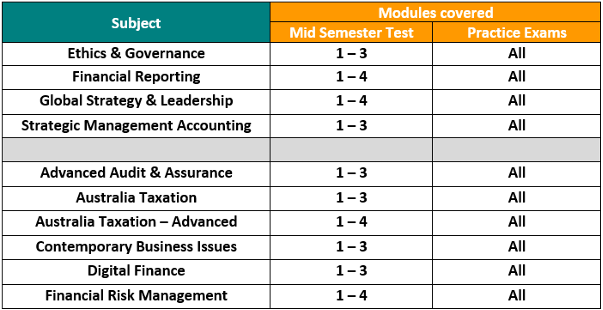
What are the dates for the Practice Exams?
Practice Exam 1 is released on the Tuesday of Week 8 at 2pm (Melbourne time) and is available until Guided Learning closes.
For Semester 1, 2026 Practice Exam 1 will be released at 2pm (Melbourne time) on 23 March.
Practice Exam 2 is released on the Friday of Week 8 at 2pm (Melbourne time) and is available until Guided Learning closes.
For Semester 1, 2026 Practice Exam 2 will be released at 2pm (Melbourne time) on 26 March.
When does the Ask The Expert (ATE) forum open and close?
The ATE forum is available from the start of semester up until the Monday before the CPA program exam period.
For Semester 1, 2026 the ATE forum will be available from 2 February up until 11 April (11:59pm Melbourne time).
Ready to start? Jump into an Assist Course
___
Looking for connections?
Join our Facebook Groups
___
___

